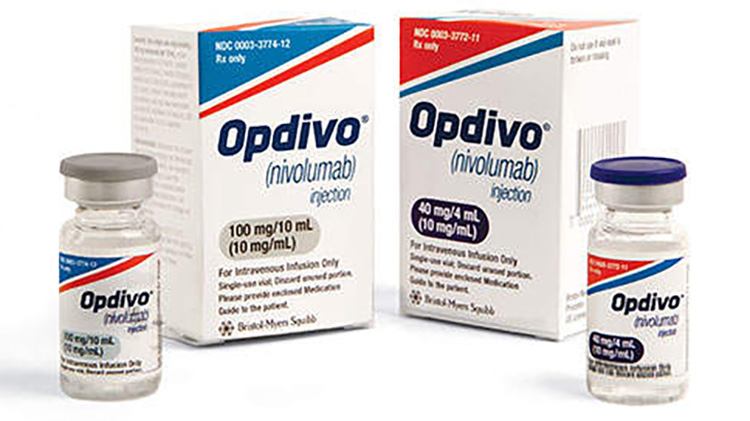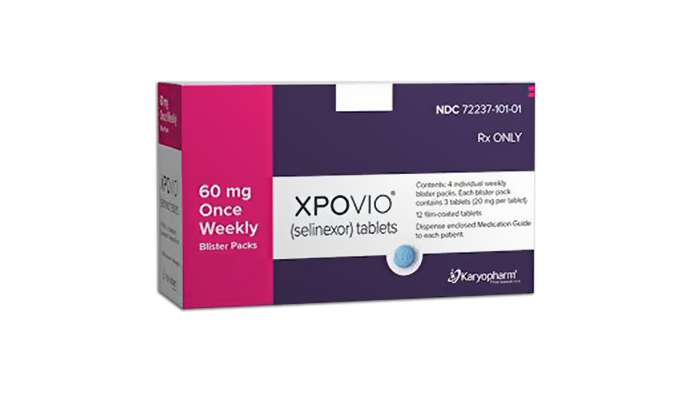Opdivo (Nivolumab) vs Xpovio (selinexor)
Opdivo (Nivolumab) vs Xpovio (selinexor)
Opdivo (nivolumab) is an immune checkpoint inhibitor specifically targeting the PD-1 receptor, which is used to treat various types of cancer by enhancing the body's immune response against cancer cells. Xpovio (selinexor) works differently; it is a selective inhibitor of nuclear export (SINE) that blocks the export of tumor suppressor proteins from the nucleus of cancer cells, leading to their accumulation and triggering cancer cell death. The choice between Opdivo and Xpovio would depend on the specific type of cancer, its stage, the patient's overall health, and previous treatments, as each medication has been approved for different indications and has a distinct mechanism of action and side effect profile.
Difference between Opdivo and Xpovio
| Metric | Opdivo (Nivolumab) | Xpovio (selinexor) |
|---|---|---|
| Generic name | Nivolumab | Selinexor |
| Indications | Various types of cancers, including melanoma, lung cancer, and renal cell carcinoma | Multiple myeloma, diffuse large B-cell lymphoma |
| Mechanism of action | PD-1 immune checkpoint inhibitor that enables the immune system to attack cancer cells | Selective inhibitor of nuclear export (SINE) that blocks the export of tumor suppressor proteins |
| Brand names | Opdivo | Xpovio |
| Administrative route | Intravenous infusion | Oral |
| Side effects | Fatigue, rash, musculoskeletal pain, pruritus, diarrhea, nausea | Nausea, vomiting, fatigue, anorexia, weight loss, diarrhea |
| Contraindications | None known specifically; use with caution in patients with autoimmune diseases or those receiving immunosuppressive therapy | Thrombocytopenia, neutropenia, gastrointestinal toxicity |
| Drug class | Monoclonal antibody, Immune checkpoint inhibitor | Antineoplastic agent, Nuclear export inhibitor |
| Manufacturer | Bristol Myers Squibb | Karyopharm Therapeutics |
Efficacy
Opdivo (Nivolumab) Efficacy in Lymphoma
Opdivo, known generically as Nivolumab, is a programmed death receptor-1 (PD-1) blocking antibody used in cancer immunotherapy. Its efficacy in treating lymphoma, particularly classical Hodgkin Lymphoma (cHL), has been demonstrated in several clinical trials. In patients with relapsed or refractory cHL after autologous stem cell transplantation (ASCT) and brentuximab vedotin, Nivolumab has shown a significant response rate. The CheckMate-205 trial, a pivotal phase 2 study, reported that Nivolumab monotherapy resulted in an objective response rate (ORR) of 69% in these patients, highlighting its potential as an effective treatment option for cHL.
For other types of lymphoma, such as non-Hodgkin lymphoma (NHL), the efficacy of Opdivo is still under investigation. However, early clinical trials and case studies suggest that Nivolumab may also provide therapeutic benefits to patients with certain subtypes of NHL, including those with relapsed or refractory disease. Nevertheless, further research is necessary to fully establish the efficacy and safety of Nivolumab in the treatment of various forms of NHL.
Xpovio (Selinexor) Efficacy in Lymphoma
Xpovio, with the active ingredient Selinexor, is a selective inhibitor of nuclear export (SINE) compound that has been studied for its efficacy in treating multiple types of lymphoma. In Diffuse Large B-Cell Lymphoma (DLBCL), Selinexor has been evaluated in combination with other therapies. The SADAL study, a single-arm, open-label, multicenter phase 2b trial, demonstrated that Selinexor monotherapy induced a 28% ORR in patients with relapsed or refractory DLBCL who had received at least two prior therapies. This suggests that Selinexor could be a viable treatment option for patients with limited alternatives.
Moreover, ongoing research is exploring the use of Selinexor in other lymphoma subtypes, including mantle cell lymphoma (MCL) and follicular lymphoma (FL). While the data on efficacy in these subtypes are still emerging, early results indicate that Selinexor, particularly in combination with other agents, holds promise as a part of a therapeutic regimen for various forms of lymphoma. As with any new treatment, the benefits of Selinexor must be weighed against potential side effects, and its use should be guided by clinical trial evidence and regulatory approvals.
Regulatory Agency Approvals
Opdivo
-
European Medical Agency (EMA), European Union

-
Food and Drug Administration (FDA), USA

-
Health Canada

-
Pharmaceuticals and Medical Devices Agency (PMDA), Japan

-
Therapeutic Goods Administration (TGA), Australia

-
Medsafe (NZ)

Xpovio
-
European Medical Agency (EMA), European Union

-
Food and Drug Administration (FDA), USA

Access Opdivo or Xpovio today
If Opdivo or Xpovio are not approved or available in your country (e.g. due to supply issues), you can access them via Everyone.org.
How it works

Make an enquiry
Choose the medicine you want to buy, answer a couple of questions, and upload your prescription to speed things up. We’ll get back to you within 24 hours.


Make an enquiry
Choose the medicine you want to buy, answer a couple of questions, and upload your prescription to speed things up. We’ll get back to you within 24 hours.


Breeze through the paperwork
We'll guide you through the required documents for importing unapproved medicine, ensuring you have all the necessary information.


Get a personalized quote
We’ll prepare a quote for you, including medicine costs and any shipping, administrative, or import fees that may apply.


Receive your medicine
Accept the quote and we’ll handle the rest - sourcing and safely delivering your medicine.

Some text on this page has been automatically generated. Speak to your physician before you start a new treatment or medication.
Let's talk
If you have any questions, call us or send us a message through WhatsApp or email:
Contact us




